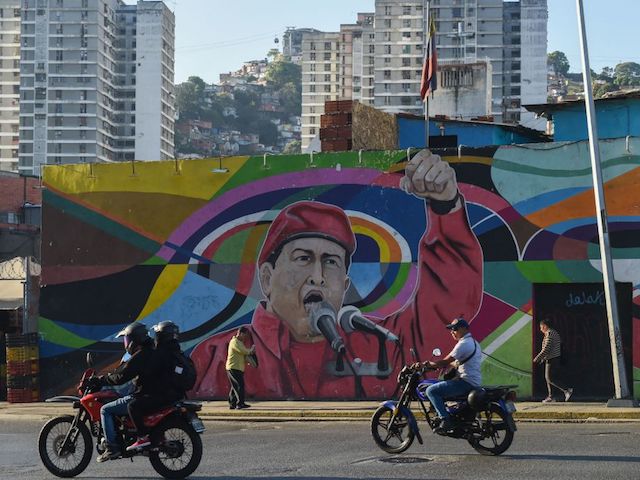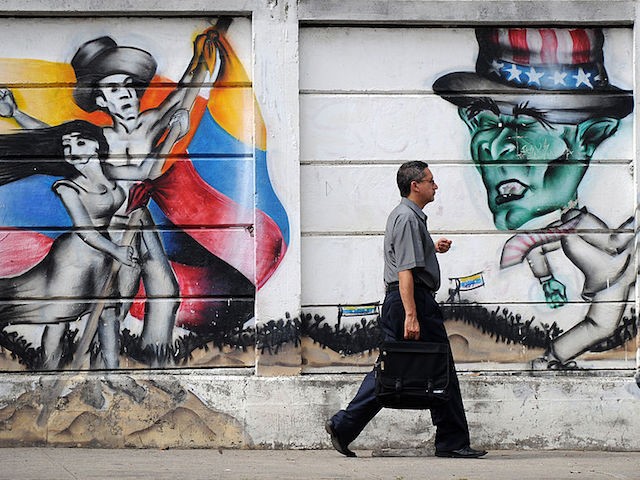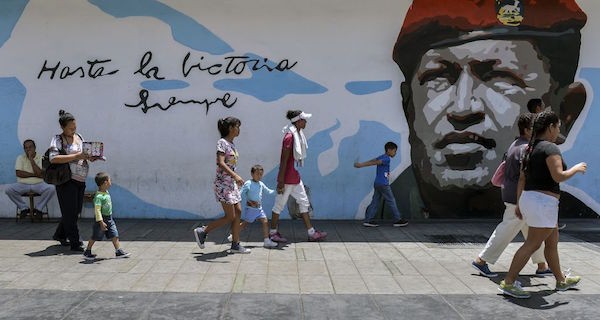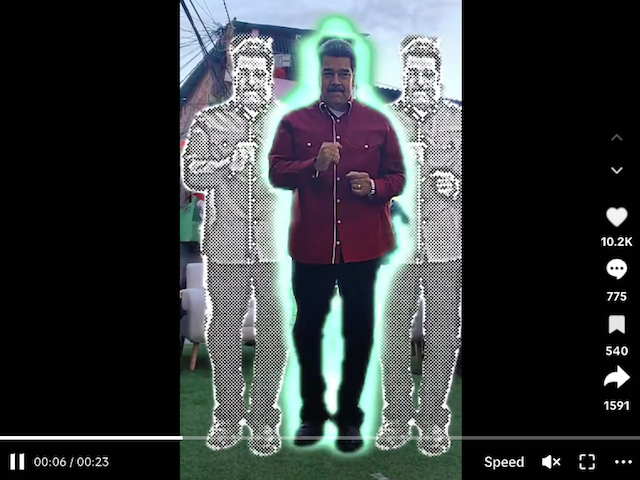CARACAS, Venezuela – During his past decade in power, Venezuelan dictator Nicolás Maduro has been many things: a human rights criminal, a “worker-president,” a “driver of victories,” and slurs I would rather spare you from reading.
But now, he has a new face: a TikTok influencer.
Maduro has been trying to “clean” his image – and, by extension, that of his socialist regime – through his account on the Chinese social media application, presenting himself as a more “humane” and relatable person. The account masks the reality of Maduro’s position at the head of a regime that has clung to power for almost a quarter of a century, known for its gross human rights violations and for bringing my country to ruin, causing the worst migrant crisis in the region’s history.
On Tiktok, Maduro is “hip” and approachable, a man who is always working and always surrounded by the people, who “love him,” cracking jokes and puns here and there — something pulled straight out of a bizarre alternate dimension.
Maduro has a very steady content flow on TikTok, sometimes posting up to three different videos per day. There does not seem to be a logic to what topic he chimes in on but, with very few exceptions, they all feature Maduro as the protagonist with a carefully constructed false depiction of a “cool” president.
One of the more recent videos, posted in mid-August, features Maduro’s narration as he gives you a quick rundown of all the things he did during that week. The “hard-working” president reminds you that his regime is on “the right side of history.”
“Always working for the happiness of the people!” the caption reads. “Nobody can beat work!”
@nicolasmadurom ¡Siempre trabajando por la felicidad del Pueblo! ¡Al trabajo nadie le gana! #resumensemanal #nicolasmadurom #venezuela
In one video, posted on July 19, Maduro is seen sampling coffee with two Venezuelans while explaining plans to export Venezuelan coffee, which he claims is “the best in the world.”
@nicolasmadurom El mejor café de Venezuela pa’l mundo 😎 ¿Qué dice el pueblo? #café #venezuela #nicolasmadurom
Another video shows Maduro narrating Venezuela’s “victory” against the United States, depicting our country and the United States as American boxing legends Muhammad Ali and George Foreman, respectively, using footage from their iconic heavyweight championship boxing match held in October 1974.
@nicolasmadurom ¡Venezuela es como el gran Muhammad Ali; dándole duro al imperio! #venezuela #nicolasmadurom #boxeovenezolano
In another video, posted in June, Maduro celebrates that Friday has arrived and, with it, the weekend. The socialist dictator wishes you a great weekend as clips of him dancing (with added special effects) are shown.
@nicolasmadurom ¡Llegó el viernes Venezuela! #esviernesyelcuerpolosabe #nicolasmadurom #venezuela
Other notable video examples feature Maduro playing basketball with a group of kids, being taught a few skating tips by a Venezuelan skater, or unleashing his “forbidden” dance moves.
I don’t really have a way to know how much the regime is paying whoever is editing these videos, but I sure hope it is more than the 130 bolivars ($4) monthly minimum wage.
Some of the videos give you a glimpse into the luxurious lives that Maduro and high-ranking members of the socialist regime live. In one of these videos, posted in March, Maduro is seen playing around with a 360º camera that your average Venezuelan — impoverished by two decades of socialism — cannot possibly hope to afford. While I cannot ascertain which specific camera model Maduro was using, a simple search at a local website has one such camera ranging from $820 to $920 in price, impossible to afford for the vast majority of the country.
TikTok is owned by Chinese tech-giant Bytedance, a company with ties to the Chinese Communist Party, which reportedly allows the Chinese regime to have access to all of the users’ data. The platform, which operates in over 150 countries, is know to push highly dangerous content to children and teenagers alike, such as “suicide challenges,” content that encourages eating disorders, and other types of potentially harmful “challenges.”
The platform does not operate in China. Instead, Bytedance operates a sister platform called Douyin in Chinese territory that, unlike TikTok’s harmful content, focuses on pushing educational content and features strict controls that limit teenagers’ time on the app.
Maduro’s TikTok account is part of a regime-wide effort to fool both its subjects and the world into thinking everything is normal in Venezuela – which succeeds briefly before reality hits: our economic situation never quite recovered from the socialist collapse and the only thing holding Venezuela together at the seams is U.S. dollar the Maduro regime “hates” so much.
The influencer-esque account is one of several tools in the regime’s repertoire being used to “refresh” the dictator’s image. Maduro’s Tiktok content appears to be produced in tandem with his new TV show, as a sizable portion of the account’s footage is filmed on the same set.
Maduro has been publicly fighting a sort of identity crisis since he succeeded Hugo Chávez to the extent that, during his first years as president, he had no image of his own and instead tried to emulate Chávez. Fast forward a few years later, and everything has been dialed to eleven.
You’ll notice that in the videos posted on Maduro’s TikTok account there is a noticeable lack of regime imagery, such as the “Eyes of Chávez” and other Socialist Party paraphernalia that we all instinctively associate with the regime’s brutality, repression, and other heinous acts.

Men on motorcycles ride past a mural depicting Venezuela’s late President Hugo Chavez (1954-2013) in Caracas, Venezuela, March 2, 2023. (MIGUEL ZAMBRANO/AFP via Getty Images)

A person passes by a mural painting with a caricature of US President George W.Bush (R) in Caracas on September 12, 2008. (JUAN BARRETO/AFP via Getty Images)

People walks by a graffiti with an image of late President Hugo Chavez in Caracas on May 11, 2018. (LUIS ROBAYO/AFP/Getty Images)
Those haven’t gone away. It’s just that they are not good PR for Maduro’s show and his “clean” rebrand. Most of the world now understands the relationship between the Chávez socialist branding and the human rights atrocities Venezuelans have faced for decades, so Maduro is seeking to project something more palatable to an international audience while doing absolutely nothing to ease his stranglehold on power or civilize his violent narco-regime.
Maduro’s TikTok antics were the center of a brief controversy in August. Maduro invited a few Venezuelan comedian “TikTokers” to participate as guests in Maduro’s weekly show and even interact with Maduro, with some of them seizing the opportunity to create “comedic” content for their respective channels featuring the socialist dictator.
Suffice it to say, the backlash was so astoundingly (and justifiably) huge that some of the influencers ended up issuing apologies shortly afterward. The influencers reportedly received a barrage of insults and criticism from Venezuelan TikTok users, accusing them of being accomplices of the regime, having received money from Maduro, and branding them as “plugged-ins,” a colloquial term used in Venezuela to describe someone who is “plugged in” with the regime to reap some form of benefit from it, be it political or economic.
Venezuelan TikTok “influencer” Emmanuel Marcano, one of Maduro’s guests, issued a public apology in two Tiktok videos shortly after the controversy erupted in which he denied allegations that he had received money from the Maduro regime to participate as a guest in the dictator’s weekly show.
“There was no check, because if I don’t work I don’t eat, I don’t care about politics or anything like that, many think that you just arrive, they give you a check, and say welcome to the ‘plug’ and it’s not like that,” Marcano said on the video. “I feel proud because someone who rules the country saw me.”
@emmanuel.marc1 Hablen bien o mal que hablen❤️🙏 lo siento pero lo tenia que decir #venezuela #pais @zuleyma yanez
It’s one thing to go on someone’s show or podcast, that’s fine in my book — but don’t expect people to not criticize you for going on the dictator’s show after his regime has forced a fifth of our population to flee from our country.
While Maduro gets to freely do as he pleases with his TikTok account, Venezuelans do not share the same liberties when it comes to content creation, and that extends to other social media platforms beyond TikTok.
In 2017, the Maduro regime passed an “anti-hate speech,” law. This piece of legislation, ambiguous by design, can land you in prison for up to 20 years for publishing content that the regime deems “hateful.” One of the most renowned cases of the regime using that law to punish someone that involves TikTok content is that of Venezuelan woman Olga Mata.
In April 2022, Mata published a dark-humor viral video on TikTok to satirize Maduro and members of the socialist regime by comparing them to types of arepas — Venezuela’s flagship corn cake dish. She was arrested with her son under “incitement to hatred” charges and forced to issue a public apology.
I don’t know who the “influencers” hanging out with Maduro are, thankfully – I’m either too old to know or too detached from such things to care. The same can be said about Maduro’s TikTok account because I don’t use that platform, but I won’t deny the reach and grip TikTok has attained worldwide, especially among the youth.
The message Tiktok sends with Maduro’s presence there is that if nobody likes you because you are a dictator that has brought your country to a ruin, your regime is known for gross human rights violations, you’ve arrested political dissidents, censored the media, and have caused the worst migrant crisis in the region’s history — where can you go to refresh your public image? China’s premier international social media application, apparently.
Christian K. Caruzo is a Venezuelan writer and documents life under socialism. You can follow him on Twitter here.

COMMENTS
Please let us know if you're having issues with commenting.